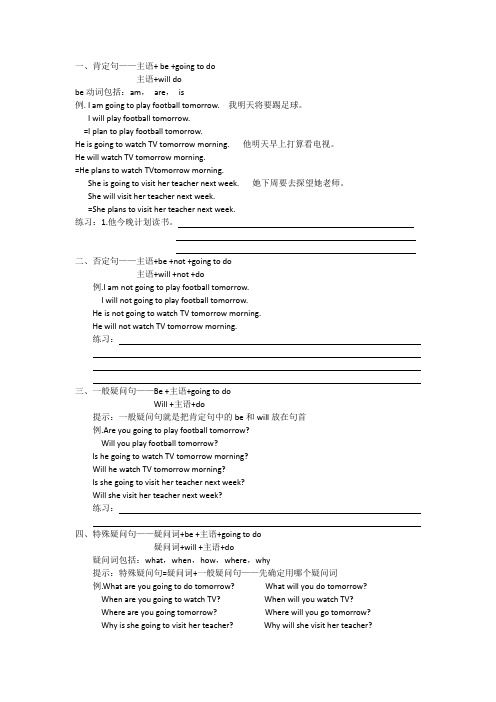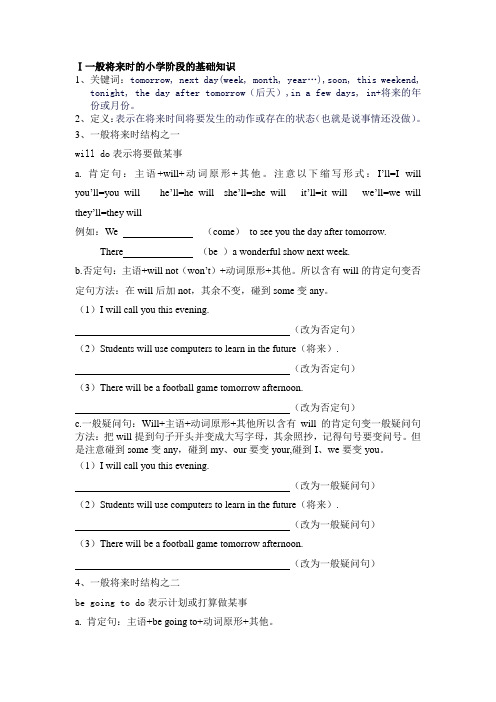一般将来时(小学)
小学英语一般将来时

Be动词该怎么随主语变化呢?
当主语是“I”的时候,后面的be动 词要用“am”
I am
I am going to play chess.
Be动词该怎么随主语变化呢?
当主语是“you” “we”的时候,后面 的be动词要用“are”
You We
are
You are going to swim. We are going to swim.
主语+ be going to+ 动词原形+ (宾语)+ 时间状语
谓语
3
注意要点
1 be going to 的“be”指的是Байду номын сангаас语中的 be动词。
am
Be 动词
is
are
2 Be动词需要根据主语的人称变化而变化
I be going to play chess this weekend. He am going to go hiking on Sunday. We is going to do homework.
I abme going to play chess this weekend. He aims going to go hiking on Sunday. We airse going to do homework.
主语
Alice Peter
单个的名字
is
单个人
My sister His brother
一般将来时 be going to
一般将来时
定义definition 基本结构 form 注意要点 tips 练习 practice
1
定义
表示将来某一时刻的动作或状态,或将来某一段时间内经常 的动作或状态。
小学六年级英语一般将来时四个句型

一、肯定句——主语+ be +going to do主语+will dobe动词包括:am,are,is例. I am going to play football tomorrow. 我明天将要踢足球。
I will play football tomorrow.=I plan to play football tomorrow.He is going to watch TV tomorrow morning. 他明天早上打算看电视。
He will watch TV tomorrow morning.=He plans to watch TVtomorrow morning.She is going to visit her teacher next week. 她下周要去探望她老师。
She will visit her teacher next week.=She plans to visit her teacher next week.练习:1.他今晚计划读书。
二、否定句——主语+be +not +going to do主语+will +not +do例.I am not going to play football tomorrow.I will not going to play football tomorrow.He is not going to watch TV tomorrow morning.He will not watch TV tomorrow morning.练习:三、一般疑问句——Be +主语+going to doWill +主语+do提示:一般疑问句就是把肯定句中的be和will放在句首例.Are you going to play football tomorrow?Will you play football tomorrow?Is he going to watch TV tomorrow morning?Will he watch TV tomorrow morning?Is she going to visit her teacher next week?Will she visit her teacher next week?练习:四、特殊疑问句——疑问词+be +主语+going to do疑问词+will +主语+do疑问词包括:what,when,how,where,why提示:特殊疑问句=疑问词+一般疑问句——先确定用哪个疑问词例.What are you going to do tomorrow? What will you do tomorrow?When are you going to watch TV? When will you watch TV?Where are you going tomorrow? Where will you go tomorrow?Why is she going to visit her teacher? Why will she visit her teacher?。
小学英语一般将来时

一般将来时1、第一人称(we 和I)用shall:shall+动词原形意义: 一般单纯地表示将来某个时间将要发生的动作或存在的状态。
肯定句:We shall go on the Pearl River.否定句:We shall not/shan’t go on the Pearl River.一般疑问句:-- Shall we go on the Pearl River?--Y es, we shall. /No, we shall not/shan’t.特殊疑问句:--When shall we go on the Pearl River?--Tomorrow morning.2、第一、二、三人称用will: will+动词原形意义: 一般单纯地表示将来某个时间将要发生的动作或存在的状态。
肯定句:He will go on the Pearl River.否定句:He will not/won’t go on the Pearl River.一般疑问句:--Will he go on the Pearl River?--Y es, he will. /No, he won’t.特殊疑问句:--When will he go on the Pearl River?--Tomorrow morning.3、第一、二、三人称用be going to+动词原形意义:用来表示近期将要发生的动作或存在的状态,以及计划、安排、打算要做的事。
肯定句:He is going to watch birds there.否定句:He is not/isn’t going to watch birds there.一般疑问句:--Is he going to watch birds there?--Y es, he is. / No, he isn’t.特殊疑问句:--What is he going to do?-- He is going to watch birds there.4、用现在进行时表示表示位置转移的动词(如:go, come, leave, start, arrive等),可用现在进行时表示将来时。
小学语法一般将来时

用will构成的将来时,所表示的动作与人的主观愿望无关。 I will graduate from this school soon. You will stay alone after I leave.
一般将来时
用法
shall和will在口语的一些疑问句中相当于情态动词。Shall一般与第一人称连用,will多与第二人称连用。 Shall we go to the zoo next Saturday? Will you please open the box for me?
一般将来时
一般将来时
否定句 主语+be(am/is/are ) not going to+动词原形+… She isn’t going to see a movie. I am not going to watch TV.
Be(Am/Is/Are )+主语+going to+动词原形+…?
Yes, they are. / No, they aren’t.
一般将来时
01
02
03
CONTENTS
一般将来时
01
Hale Waihona Puke 02表示将要发生的动作或打算、计划,
准备做某事。
一般将来时
主语+be(am/is/are ) going to+动词原形+…
主语+will+动词原形+…
结构:
一般将来时
一般将来时
肯定句 主语+be(am/is/are ) going to+动词原形+… They are going to have a trip. He is going to make a plane model. I am going to get up early.
一般将来时知识点及练习

Ⅰ一般将来时的小学阶段的基础知识1、关键词:tomorrow, next day(week, month, year…),soon, this weekend,tonight, the day after tomorrow(后天),in a few days, in+将来的年份或月份。
2、定义:表示在将来时间将要发生的动作或存在的状态(也就是说事情还没做)。
3、一般将来时结构之一will do表示将要做某事a. 肯定句:主语+will+动词原形+其他。
注意以下缩写形式:I’ll=I will you’ll=you will he’ll=he will she’ll=she will it’ll=it will we’ll=we will they’ll=they will例如:We (come)to see you the day after tomorrow.There (be )a wonderful show next week.b.否定句:主语+will not(won’t)+动词原形+其他。
所以含有will的肯定句变否定句方法:在will后加not,其余不变,碰到some变any。
(1)I will call you this evening.(改为否定句)(2)Students will use computers to learn in the future(将来).(改为否定句)(3)There will be a football game tomorrow afternoon.(改为否定句)c.一般疑问句:Will+主语+动词原形+其他所以含有will的肯定句变一般疑问句方法:把will提到句子开头并变成大写字母,其余照抄,记得句号要变问号。
但是注意碰到some变any,碰到my、our要变your,碰到I、we要变you。
(1)I will call you this evening.(改为一般疑问句)(2)Students will use computers to learn in the future(将来).(改为一般疑问句)(3)There will be a football game tomorrow afternoon.(改为一般疑问句)4、一般将来时结构之二be going to do表示计划或打算做某事a. 肯定句:主语+be going to+动词原形+其他。
小学一般将来时讲解

小学一般将来时讲解1. 介绍小学一般将来时是英语语法中的一种时态,用来表示将来发生的行动或事件。
在这种时态中,动作与时间的关系是相对的,即动作将在将来某一时刻发生。
2. 构成小学一般将来时由情态动词 "will" 或 "shall" 加上动词原形构成。
下面是一些例子:- I will go to school.- She will play basketball.- We shall see a movie.3. 肯定句结构小学一般将来时的肯定句结构是:主语 + will/shall + 动词原形+ 其他。
4. 否定句结构小学一般将来时的否定句结构是:主语 + will/shall + not + 动词原形 + 其他。
5. 疑问句结构小学一般将来时的疑问句结构是:Will/Shall + 主语 + 动词原形+ 其他?6. 使用场景小学一般将来时常用于以下场景:- 表示未来的计划或打算:I will go to the park tomorrow.- 表示预测:It will rain later.- 表示意愿或请求:Will you help me with my homework?7. 注意事项在小学一般将来时中,我们要注意以下几点:- 不使用"will"或"shall"来表达对他人的承诺或决定,如"I promise"或"I decide"。
- 在口语中,经常使用"will"而不是"shall"。
- 在第一人称疑问句中,我们可以使用"shall"代替"will",但这并不常见。
希望这份文档对你的小学一般将来时的学习有所帮助!。
小学五年级重点知识归纳一般将来时的用法与句型构造

小学五年级重点知识归纳一般将来时的用法与句型构造【小学五年级重点知识归纳:一般将来时的用法与句型构造】一、一般将来时的用法一般将来时表示将来某个时间会发生的事情或者存在的状态。
它通常用来表达计划、打算、预测、意愿等。
二、一般将来时的句型构造1. 肯定句结构:主语 + will + 动词原形 + 其他成分例句:I will go to the park tomorrow.2. 否定句结构:主语 + will not / won't + 动词原形 + 其他成分例句:She won't eat dinner with us tonight.3. 疑问句结构:Will + 主语 + 动词原形 + 其他成分?例句:Will they visit their grandparents this weekend?4. 特殊疑问句结构:特殊疑问词 + will + 主语 + 动词原形 + 其他成分?例句:Where will you go on your vacation?三、一般将来时的常见时间状语1. tomorrow(明天)2. next week(下周)3. in the future(将来)4. soon(很快)5. in a year(一年后)等等四、一般将来时的其他用法1. 表示预测或推测的句子,常使用的词汇有:think,believe,hope,expect等。
例句:I think it will rain later.我认为一会儿会下雨。
2. 表示意愿、请求、建议等情态动词的用法。
例句:I will help you with your homework.我会帮你写作业。
五、一般将来时使用注意事项1. 在一般将来时中,主语为第三人称单数时,动词要加上“s”或者“es”。
例句:He will playsoccer with his friends tomorrow.2. 一些动词在一般将来时的变化形式是不规则的,需要特别注意。
小学英语一般将来时

be going to句型的特殊疑问句形式。
疑问词 + be动词 +主语 + going (to) +(动作)+(时间副词)?
常用的疑问词有:
what where when which who how
什么(提问事情) 在哪里 (提问地点) 在什么时候 (提问时间) 选择哪一个(提问人或物) 谁 (提问人) 怎么样 (提问方式)
( B ) 9. We ________ the work this way next time. A. do B. will do C. going to do D. will doing
What is Hui Tailang going to do?
He is going to ski.
What is Lan Yangyang going to do?
He is going to sweep the floor.
What is Xi Yangyang going to do?
一般将来时be going to句式的构成: 主语 + be going to +动词原形/地方 +(将来时间)
visit 1. We are going to grandparents tomorrow. 2. Sheisgoing to go soon. read 3. He is going to books this evening. 4. My parents is are going to Beijing next week. is改为 5. John is go to the park.
①通常用will + V说或写都尽量使用“I’ll, You’ll, He‘ll , She’ll , It’ll, We’ll , They’ll …”的简缩形式 否定形式 :will not = won’t I won‘t see him again.
- 1、下载文档前请自行甄别文档内容的完整性,平台不提供额外的编辑、内容补充、找答案等附加服务。
- 2、"仅部分预览"的文档,不可在线预览部分如存在完整性等问题,可反馈申请退款(可完整预览的文档不适用该条件!)。
- 3、如文档侵犯您的权益,请联系客服反馈,我们会尽快为您处理(人工客服工作时间:9:00-18:30)。
2. be going to引导的一般将来时:表示将来发生的动作或存在的状态
肯定句 :主语 + be ( am, is, are ) + going to + 动词原形 +其他.
I’m going to go there next month. 下个月我将去那里。 He is going to visit his grandparents next year. 明年他将要去看望他的爷爷奶奶。 They are going to find a new house to live in. 他们将要找一所新房子住。
They will do heavy work.
They won`t do Will they do heavy work. heavy work?
Yes, they will. No, they won't.
3.“There be”句型的一般将来时 肯定句: There will be +名词+其他成份 [注意]:无论后面加单数名词或复数形式,be都必须用原形。
一、用will或shall表示。“助动词will或shall+动词原形”这一形式 表示将来发生的事情,用于征求对方的意见或表示客气的邀请。 在口语中will用于所有人称,书面语中第一人称常用shall。如:
1. Tomorrow will be Sunday. 明天就是星期天。 2. The rain will stop soon. 雨很快就要停了。
否定句 : 主语 + be ( am, is, are ) + not + going to + 动词原形 +其他.
He isn’t going to see the movie. 他不会去看电影。 You aren’t going to work on the farm this weekend. 这个周末你们不去家场劳动。 We aren’t going to have a meeting this afternoon. 今天下午我们不开会。
will句式总结:
肯定
否定
一般疑问 回答
பைடு நூலகம்
I will have
I won`t have Will I have
Yes,I will.
many presents. many presents. many presents? No,I won`t.
He will do dull He won`t do
疑问句 Be ( am, is, are ) + 主语 + going to + 动词原形 +其他?
Are you going to have a party tomorrow? 明天你们要开联欢会吗? Is he going to write to his friends? 他要给他的朋友写信吗? Are they going to buy a new car? 他们要买一辆新车吗?
特殊疑问句 : 特殊疑问词 5个w (what , where , who , when , how) 特殊疑问词 + be ( am, is, are ) + 主语 + going to + 动词原形 +其他?
What are you going to have tomorrow? 明天你们要吃什么? What are you going to do tonight? I’m going to watch the baseball game. 今晚你打算做什么?我想要看棒球赛。
3. Shall we go there at five? 我们五点钟去那儿,好吗?
4. Will you please open the door? 请你把门打开,好吗?
二、用be going to结构表示。 “be going to+动词原形”用来表示近期或事先考虑过 的将要发生的动作以及已有迹象表明必将发生某事, 意为“打算;就要”。如:
Will students go to school in the future ? 特殊疑问句:特殊疑问词 5个w (what , where , who , when , how)
特殊疑问词+will +主语+动词原形+其他? What will your dream school have ?
一般将来时
一般将来时:表示将要发生的事 情,常与将来的时间连用,如 tomorrow ,next year\ day\
week\ month… , soon , the day after tomorrow(后天) , in five days , in the future等等
1. will 引导的一般将来时:表示将来发生的动作或存在的状态,最基本的结 构:will + 动词原形 “主谓(宾)句型”的一般将来时: 肯定句:主语+ will +动词原形+(宾语)+其他
五、用“be+动词不定式”或用“be about to +动词原形”的结构表示 (不能与tomorrow, next week 等表示明确将来时的时间状语连用)如:
1. He is to visit Japan next year. 明年他将访问日本。 2. They're about to leave. (=They're leaving.) 他们就要走了。
1. Uncle Wang is coming. 王叔叔就要来了。 2. They're leaving for Beijing. 他们即将前往北京。
四、用一般现在时表示。 根据规定或时间表预计要发生的动作,在时间和条件状语从句中, 都可用一般现在时表示将来时。如:
1. The new term starts (begins) on August 29th. 新学期八月二十九日开学。 2. If it doesn't rain tomorrow, we will go out for a picnic. 如果明天不下雨,我们将出去野餐。
4.一般将来时两种基本句式的区别:
①be going to+动词原形”和“will+动词原形” 这两种表示将来时态的结构没什么区别。但在 现代英语中,特别是在口语中,表示将来时多 用“be going to+动词原形”这一形式。 ②另外他们主要区别在于“be going to+动词 原形”表示一个事先考虑好的意图,相当于 “打算、计划、准备”,而will则表示未经事 先考虑的意图。
1. We're going to meet outside the school gate. 我们打算在校门口见面。 2. Look! It's going to rain. 瞧!快下雨了。
三、用现在进行时表示。 表示位置转移的动词(如:go, come, leave, start, arrive等), 可用现在进行时表示将来时。如:
Some day people will go to the moon . 否定句:主语+ will +not+动词原形+(宾语)+其他.
在will 的后面加not即可。will not 可缩写为 won’t They won’t use books .
一般疑问句:Will + 主语+动词原形+其他? 把will 提到句子主语之前,结尾变问号。
jobs.
dull jobs.
Will he do dull Yes, he will.
jobs?
No ,he won`t.
There will be a There won`t be Will there be a Yes,there will. computer in it. a computer in it. compuer in it. No,there won`t.
There will be only one country. 否定句:在will后面加not.
There won’t be only one country. 一般疑问句:把will提到there之前。
Will there be only one country? Yes, there will. / No, there won’t.
